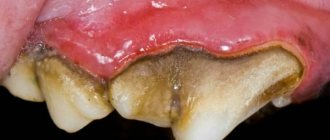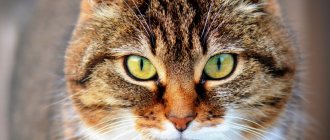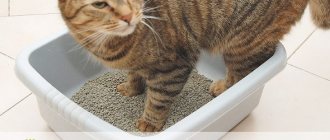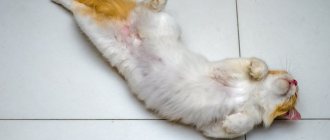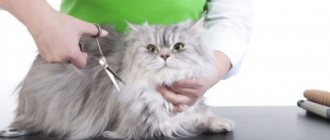You can hear sneezing not only from people, but also from pets. Our mustachioed-striped pets often sneeze when they climb into a dusty corner and dust gets into their nose, but if this happens constantly, the cat’s nose and eyes are running, he coughs, then the problem is clearly not simple and requires the intervention of specialists.
What to do if your cat sneezes? What caused it? It is these questions that we will try to answer in this material.
Causes of sneezing
There are a large number of pathologies in which a cat often sneezes:
- Allergic reaction to dust, household chemicals, tobacco smoke, food, etc. Allergens, when they get on the nasal mucosa, irritate it, causing sneezing, and the eyes may also become watery.
- Parasite infestation is also the reason why a cat sneezes. This process can most often be triggered by toxoplasma or dirofilaria, and is also accompanied by fever and cough.
- The presence of a foreign body in the nasal passages, for example, a piece of food, litter for a tray, etc. can get stuck in the nose. At the same time, the cat rubs its muzzle with its paws and breathes heavily through its nose, and if the object has injured the mucous membrane, then it sneezes with blood.
- A cat sneezes and coughs when infected with a bacterial or viral infection. This is also indicated by additional symptoms of the disease - the temperature rises, the eyes water.
- Neoplasms in the nasal cavity - polyps do not allow the cat to breathe freely, so it sneezes and breathes with its mouth open.
- Malignant tumors are the most dangerous disease accompanied by sneezing. In this case, when sneezing, blood may come out of the nose, and the general condition of the cat worsens.
- If a cat sneezes, then he may have asthma, but then the animal will also have attacks of suffocation, during which he needs quick help.
- After hypothermia, the cat catches a cold - she constantly sneezes, snot flows from her nose, her eyes water, and a cough may appear.
- Diseases of the gums and teeth can also make the cat sneeze, but at the same time it becomes difficult for him to chew, so he refuses food and loses weight.
Now we see that it is almost impossible to independently determine why a cat is sneezing, since there are many reasons for this.
Beware of hairballs in cats
A cat that grooms itself several times a day will inevitably swallow fur due to its rough tongue. In large numbers, these hairs form balls in the cat's digestive system called trichobezoards. They can cause various pathologies that can lead to intestinal obstruction. Particularly common during shedding or in long-haired cats, hair ingestion also irritates the animal's throat and causes a dry cough. Regular cleaning and a suitable diet (there are even special kibbles) is the best way to prevent this problem.
Dental problems: In an older cat, sneezing may be caused by a dental infection, the root of which is located near the nasal cavities. This infection may need to be treated with antibiotics or removal of the tooth involved. Dr. Elizabeth Tane, veterinarian.
What do we have to do?
The best thing you can do for your pet is to take him to a veterinarian, who will find out why the disease appeared. However, some owners try to treat their cat at home. Such help is reminiscent of playing roulette, because the owner does not know exactly what caused the illness.
The owner should be especially concerned if sneezing is combined with the following symptoms:
- bleeding from the nose;
- depressed state of the cat;
- elevated temperature;
- reduction in animal body weight;
- ulcers and rashes on the cat’s skin;
- profuse lacrimation;
- discharge of pus from the nasal passages and eyes;
- wheezing and whistling when breathing;
- cough;
- behavior change;
- vomit;
- diarrhea.
This combination indicates that your pet is not just allergic to dust, but has a serious illness. Moreover, some of the cat diseases can be transmitted to people.
So, if a cat sneezes and her eyes are watery, what should you do about it? Don’t wait for this to go away on its own, but go to a veterinary clinic where your pet will undergo a full examination.
Treatment of a runny nose in a cat with medications
When a runny nose is diagnosed, the animal is treated according to the following scheme:
- prescribing antipyretic drugs for fever,
- the use of drops, solutions to facilitate breathing,
- prescribing expectorants for coughs,
- taking vitamins to strengthen the immune system,
- prescribing antibiotics for complications.
Be sure to read:
The cat has a stuffy nose: reasons, how to treat it, is it possible to use nasal drops, what will happen if the runny nose is not treated
Commonly prescribed medications:
- Intranasal drops "Anandin" - stimulate the immune system.
- Naphthyzin nasal spray - used to rinse the nasal passages.
- Xylometazoline nasal drops make breathing easier.
The correct dosage is prescribed by the doctor.
How to find out why your cat has a runny nose?
At the veterinary clinic, the doctor will tell you the causes of the disease and prescribe treatment after a series of measures:
- Examination of a sick animal, which includes: examination of the mouth and throat, measuring temperature, palpating the lymph nodes and abdomen of the cat.
- Studying the history of the disease from the owner’s words: when the cat got sick, how the illness began, how many days it has been sick, how it behaves, etc.
- Conducting general and biochemical blood tests and urine tests.
- If necessary, your doctor may recommend a swab of your cat's nose or throat.
- If the veterinarian suspects the presence of polyps or a malignant neoplasm in the nose, an endoscopy of the nasal passages or an X-ray of the head will be necessary for an accurate diagnosis.
After all the results are received, the veterinarian will give an exact answer to the question: “Why is the cat sneezing and his eyes watering?”
How to treat a cat
Before you begin treating your cat, you should find out the cause of the sneezing. A visit to the veterinary clinic, a visual examination and tests will help you choose the right therapy.
The owner is required to:
- strictly follow the doctor’s recommendations,
- give your cat medications on time,
- Regularly treat (rinse, instill) the nose of a sick animal.
On a note! During therapy, the animal's diet should be changed. A runny nose negatively affects a cat's sense of smell, and poor sense of smell negatively affects digestion. During illness, it is worth choosing food with a pronounced aroma.
Why does a cat sneeze often?
There are several reasons for this cat behavior: from quite harmless to quite serious ones that pose a danger to the cat’s life.
The most common reasons:
- An increased content of dust particles - a long absence of cleaning, its poor quality can cause sneezing in cats. Cats also sneeze from construction dust during repairs and from particles of dry mixtures floating in the air.
- Allergic reaction . The presence of certain allergens in the air provokes sneezing. The most common are: household chemicals, cat litter, pollen, liquids with a strong odor (fresheners, flavors, perfumes). Strong allergens are disinfestation agents and cigarette smoke. Associated symptoms are lacrimation, itching, rash.
- Entry of an object into the respiratory tract . This reason poses a danger to the life of the animal. Small particles are removed from the nasal passages on their own when sneezing. If the cat cannot get rid of the foreign body, you should immediately contact a veterinarian. A trapped object can block the airway and lead to the death of the pet.
- Presence of internal parasites . A cause requiring treatment under the supervision of a veterinarian. Toxoplasmosis (transmitted by ticks) is expressed in cats by sneezing, fever, and rhinitis. Another disease, heartworm disease (borne by mosquitoes), affects the heart muscle. The course of the disease is similar to asthma.
- Asthma . Always characterized by additional multiple symptoms. In addition to constant sneezing, the cat experiences difficulty breathing, suffocation, and wheezing.
- Infection . Lethargy of a pet, an increase in its body temperature, lacrimation and the appearance of purulent discharge in the eyes are symptoms of mycoplasmosis, bordetellosis, chlamydia and other serious diseases. Calcivirus - the formation of ulcers in the mouth, damage to the joints - can also cause sneezing. The herpes virus, which causes rhinotracheitis, affects the mucous membranes, causing discomfort, resulting in sneezing. All of these diseases are dangerous for the animal.
- Diseases of the oral cavity and nasopharynx . Caries, gum disease, polyps lead to sneezing as a side reaction of the body. The pet loses weight, its appetite decreases due to diseases of the oral cavity. With polyps - growths in the respiratory tract - the animal experiences problems with nasal breathing and breathes through the mouth.
The listed causes and symptoms will help determine the further actions of the animal owner and the need to contact a specialist.
Diseases that cause sneezing and nasal discharge in cats
Let's look at the most common ailments that can cause your pet cat to sneeze frequently and have snot:
- Colds are perhaps one of the most common reasons why a cat sneezes and has snot. Like their owners, cats can catch colds as a result of contact with sick relatives, as well as due to a decrease in immunity caused by hypothermia.
- Allergic reactions . They can be caused by various substances that have a strong odor, for example, household chemicals or the perfume of the animal's owners. Sometimes the allergen can be tobacco smoke, pollen, house dust or even the fur of other animals.
- Various viral infections . The reason why a cat is periodically bothered by snot and sneezing may be an evil virus, for example, adenovirus or herpes.
- Eye infections such as conjunctivitis and keratitis can cause your cat to suffer from runny nose and sneezing.
- Entry of foreign objects into the nasopharynx. In this case, the increase in the sneezing reflex is caused by the body’s desire to free itself from an object that makes breathing difficult. Cats, like small children, are very curious, stick their noses everywhere and can accidentally inhale a piece of napkin, dust, fur or some other small object.
- Growths or polyps have formed in the nasopharynx, which interfere with the normal functioning of the respiratory system, causing the animal to sneeze frequently.
- Chronic asthma can provoke the appearance of the symptoms in question for a long time.
- Dental and gum disease can lead to snot and your pet sneezing.
- Malignant tumors and neoplasms - this reason is not very common, but this option should also be kept in mind.
- And finally, unpleasant symptoms in the form of sneezing and snot in a cat can be caused by the presence of parasites in the animal’s body, which have a depressing effect on the entire body and can cause breathing problems.
© shutterstock
As must have already become obvious to the reader, symptoms such as snot and the fact that the cat often sneezes can indicate the presence of a variety of diseases; using these signs alone, it is almost impossible to determine what your mustachioed friend is suffering from. Since among the potential ailments there are also very serious ones, it is better, as they say, not to tempt fate and immediately take the cat to a veterinary clinic, where a specialist can examine him and, possibly, take the necessary tests.
However, there are symptoms that even a person without special education can recognize.
What signs can be more or less likely to suggest which of the listed diseases is tormenting your pet and why he constantly sneezes, we will discuss in the next section.
What to do if your cat has a severe runny nose with sneezing
The main advice is not to rush to treat the animal yourself. Firstly, it is important to make a correct diagnosis and find out whether there is a serious illness behind the common cold. Secondly, the wrong course of treatment for even simple rhinitis can lead to irreversible consequences. A runny nose develops into a chronic form and is much more difficult to get rid of.
Self-treatment at home with antibacterial drops will not provide reliable information on the tests that need to be performed for this pathology.
At the Aibolit Plus clinic, doctors examine the animal and prescribe a course of treatment, taking into account the general condition of the animal, its age, weight, and breed. Veterinarians prescribe modern antiviral drugs, drops for the nose and eyes, medications to strengthen the immune system, and medications against bacteria and fungi. The owner is given recommendations on organizing proper nutrition, and is advised to take vitamin complexes for the pet’s quick recovery.
If you find your cat has a runny nose, don’t wait, seek medical help promptly. The doctor will quickly make a diagnosis and return your pet to health and good mood.
Viral respiratory infections
The initial problem for sneezing cats is usually a viral upper respiratory tract infection. The most common infection is feline herpes virus. Some researchers estimate that 80–90% of cats are infected with the herpes virus.
Unlike in humans, the herpes virus in cats primarily causes upper respiratory symptoms, including sneezing and discharge from the eyes and nose. As in humans, symptoms of feline herpes are aggravated by stress.
Although new research is emerging to suggest that existing medications may improve treatment outcomes for cats infected with the herpes virus, there is currently no cure and infections remain lifelong.
Other viral infections that can cause cats to sneeze include calicivirus and influenza.
Is a cat sneezing serious?
It depends on whether the cause is environmental or disease.
Sometimes the irritants that trigger the sneeze reflex are environmental, such as dust, mold, or pollen that a cat inhales, causing them to sneeze. In these cases, the sneezing is usually not serious, especially if it occurs in a single episode.
However, more often than not, cat sneezing is caused by one or more disease processes.
Most often, the initial problem is a viral infection, followed by inflammation and bacterial infections that cause damage to the internal structure of the nose, making the problem worse.
How to treat a sneezing cat?
Treatment for cat sneezing usually focuses on treating the underlying cause, if possible.
Although there are a wide range of treatment options available, owners should be aware that the goal in most cases, especially chronic ones, is to reduce the frequency and severity of symptoms rather than cure them.
More research is needed to fully understand the role that infections play in feline sneezing, but repeated or long courses of antibiotics have been shown to be effective in controlling clinical signs.
Antibiotics
Although bacterial infections are rarely the main problem, antibiotics are often used in such cases as they make the cat feel better fairly quickly.
Nasal lavage
Nasal lavage under general anesthesia may temporarily relieve clinical symptoms, regardless of cause, and may dislodge occult foreign material.
Other treatments
Other treatments that have varying levels of effectiveness include:
- Humidifiers or nebulizers
- L-lysine to minimize herpes virus flare-ups
- Steroids
- Antihistamines (cetirizine is much better than diphenhydramine in cats)
- NSAIDs
- Decongestants
- Medicines for nausea
- Surgery (in rare cases)
What causes cats to sneeze?
Cat sneezing can be surprisingly difficult to diagnose for several reasons. First, your veterinarian should confirm that your cat is indeed sneezing.
Coughing, vomiting, reverse sneezing, hiccups and wheezing can all be misdiagnosed as sneezing, and each of these symptoms comes with a separate list of possible causes.
Take a video of your cat during the episode so the vet can verify that it is indeed a sneeze.
Another obstacle to diagnosing cat sneezing is the variety of underlying causes. Infections, chronic inflammation, dental disease, cancer, and inhalation of foreign materials can cause a cat to sneeze.
To further complicate matters, cats usually experience several of these causes at the same time.
Here are some of the possible causes of sneezing in cats.
